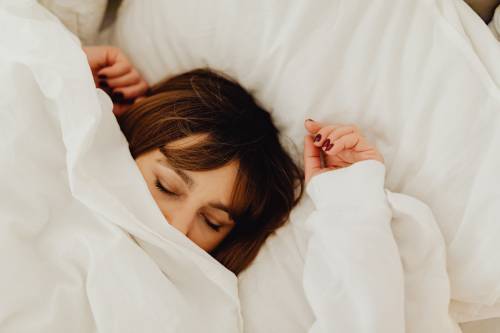

During November, we celebrate National Sleep Comfort Month.
Why is that important? As a result of poor sleep, various mental health disorders can also develop and worsen, including depression, anxiety, and even suicidal ideation. Moreover, inadequate sleep affects the United States economy by over $411 billion annually.
But what’s the connection between sleep and comfort? When you are comfortable, it is easier to fall asleep. The reason is that because your body is more relaxed, it is easier to fall asleep.
Moreover, if you are comfortable, you are more likely to sleep for longer periods of time. If you sleep in a dark, quiet environment and have a comfortable mattress and cool bedding, you may be able to stay in deep sleep for a more extended period of time. In turn, your physical and mental health will improve.
Despite the fact that we should focus on quality sleep throughout the year, November is a good time to do so because:
- The days are getting shorter, and the nights are getting darker.
- Mornings are chilly.
- We’re approaching the holiday season, a stressful time for many of us.
In honor of National Sleep Comfort Month, here are 15 ways to improve your sleep.
1. Reset your body’s internal clock.
To begin with, you need to figure out how much sleep you actually need each night. One way to do this is by resetting your internal body clock.
The first thing you need to do is to go to bed at a reasonable time for a couple of days. To determine how much sleep your body needs at night, allow yourself to wake up naturally rather than by alarm. By setting a reasonable bedtime, you’ll be sure to get enough sleep every night.
Bonus tip: Research has shown that as little as one camping weekend can reset circadian rhythms and aid in sleep.
2. Maintain a regular sleep schedule, even on weekends.
As a child, you couldn’t stand being given a bedtime by your parents. However, they had a point.
By maintaining a regular sleep schedule, your body can regulate its natural sleep-wake cycle. To put it another way, go to bed and wake up at the same time every day — even if you aren’t tired.
3. Invest in a high-quality mattress and pillow.
For you to feel comfortable enough to relax, a quality bed and pillow(s) are essential. Additionally, it prevents aches and pains by supporting the spine.
What’s considered a high-quality mattress? Studies suggest that medium-firm mattresses, especially those with adjustable firmness, promote spinal alignment, comfort, and quality sleep.
4. Purchase quality bedding and keep it clean.
The second most important factor in getting a good night’s sleep is your sheets, blankets, and comforter. It is important to choose bedding that feels comfortable to the touch and helps maintain a comfortable temperature throughout the night.
For the best sleep, you should also change and clean your sheets weekly and your comforter every two months.
5. Establish a relaxing bedtime routine.
As part of your evening routine, you can read a book, take a warm bath, or listen to relaxing music. In the hour before going to bed, do not watch TV or use electronic devices, as the blue light emitted from these devices can interfere with sleep.
6. Avoid late-night eating.
There is no doubt that late-night cravings can be extremely difficult to resist. A small snack before bedtime, however, can interfere with your sleep schedule.
When your stomach is digesting food when it should be sleeping, the rest of your body cannot shut down properly. Simply put, eat a nutritious dinner earlier in the evening and avoid late-night snacks. As a general rule, you should finish eating 2-3 hours before going to bed.
7. Don’t drink alcohol or caffeine before going to bed.
Having caffeine or alcohol before bed can interfere with your sleep. To avoid this, avoid them in the hours leading up to bedtime.
8. Keep light disruptions to a minimum.
You can disrupt your circadian rhythm and sleep if you are exposed to too much light. If you want to combat this, try investing in blackout curtains or wearing a sleep mask over your eyes. In addition, turn off any electronic devices, such as a television, computer, phone, or alarm clock.
9. Set the right temperature.
While it may seem obvious to some, the right temperature and amount of darkness are extremely important when sleeping. In order to keep yourself comfortable and sound asleep, your room and bed need to be at the right temperature.
During the colder months, you’ll want a soft, warm duvet that won’t overheat you. If the temperature is too warm or too cold, you will have trouble sleeping.
Depending on the individual, the ideal temperature varies. The room should, however, be kept around 65 degrees, according to research.
10. Embrace calming scents.
Relaxation and sleep are promoted by certain scents, such as lavender and chamomile. Place a few drops of essential oil on a pillow before going to bed, or use an aromatherapy diffuser, spray your bedding, or place a few drops on your bedding.
11. To block out noise, use a white noise machine or fan.
Sleeping in a peaceful environment is easier if you have a white noise machine or fan to block out noise.
12. Stay active on a regular basis.
In addition to improving your physical health, exercise is vital to getting a good night’s sleep. As such, take part in some form of physical activity throughout the day to help your body sleep well.
There are countless ways to get the exercise you need, whether you walk, run, bike, or take a workout class. When you exercise in the morning or afternoon, your body temperature will be raised. As the day turns to night and your body temperature begins to drop, you’ll feel drowsy again.
13. If you feel tired during the day, take a nap.
You can improve alertness and performance by taking a short nap during the day. Naps should, however, be kept short (no longer than 30 minutes) and avoided too close to bedtime.
14. Keep your worries in check.
Prior to going to bed, try to resolve any worries or concerns you may have. Think about what’s on your mind and write it down.
A stress management program might also be helpful. You can begin by organizing your work, setting priorities, and delegating tasks. Anxiety can also be eased through meditation.
15. Consult a doctor if you suffer from chronic insomnia.
Talk to your doctor if you are having trouble sleeping for more than two weeks. The cause of your insomnia may result from an underlying medical condition.
FAQs
What is sleep?
Sleep is a natural rest period for the body and mind, in which brain activity is reduced and muscle tone is increased. As a result of it, the body is able to repair and restore itself.
Why is sleep important?
The importance of sleep for physical and mental health cannot be overstated. As well as restoring your body, it helps you consolidate memories and regulate your emotions.
How much sleep should I get?
Depending on your age, health, and lifestyle, you need different amounts of sleep. It is recommended that adults sleep between 7 and 8 hours a night. The amount of sleep required by children and adolescents is even greater.
What are the consequences of not getting enough sleep?
Sleep deprivation can lead to several health problems, including:
- Decreased productivity
- Difficulty concentrating
- Fatigue
- Increased risk of accidents and injuries
- Increased risk of chronic diseases such as heart disease, stroke, diabetes, and obesity
- Irritability
- Impaired cognitive function
- Mood swings
- Reduced energy levels
- Weakened immune system
What are some common sleep problems?
There are several common sleep problems, including:
- Insomnia. An inability to sleep or difficulty staying asleep.
- Narcolepsy. A sleep disorder characterized by excessive sleepiness during the day.
- Restless legs syndrome. Having an uncontrollable urge to move your legs.
- Sleep apnea. During sleep, there is a pause in breathing.
Contact your doctor if you are experiencing any of these sleep problems. There are several treatments available that may be able to help.
Image Credit: Karolina Grabowska; Pexels; Thank you!











Deanna Ritchie
Editor-in-Chief at Calendar. Former Editor-in-Chief and writer at Startup Grind. Freelance editor at Entrepreneur.com. Deanna loves to help build startups, and guide them to discover the business value of their online content and social media marketing.